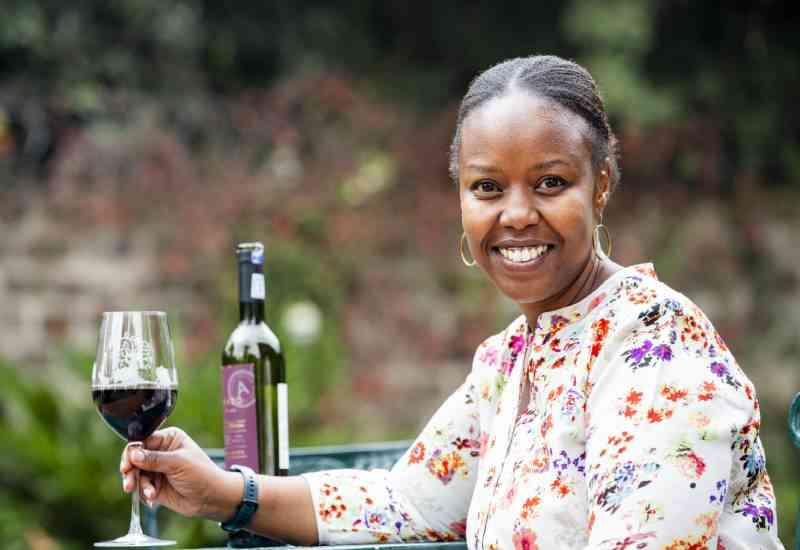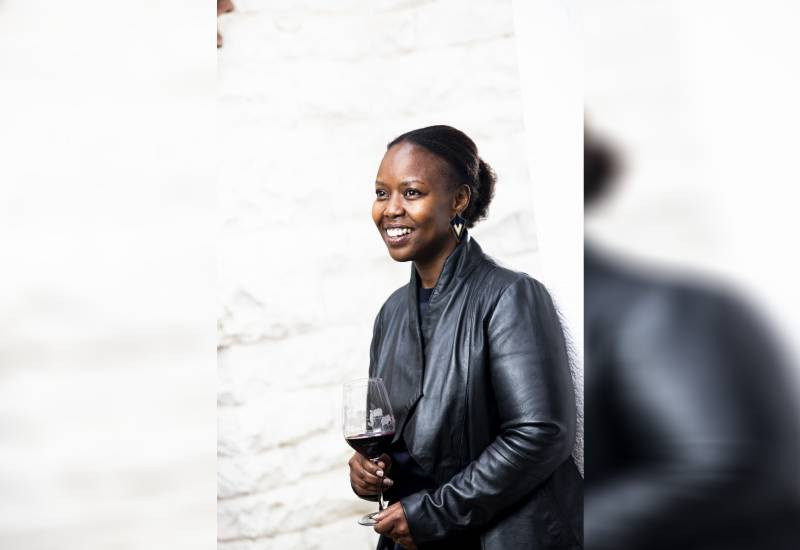
Long ago, a man called Paul Chemng’orem met his wife, Jane. The two entrepreneurial minds joined forces to build what would become their family’s legacy, Domaine Kenya Limited, an importer and distributor of fine wines and spirits that has made its mark on the industry.
Paul liked cars, and Jane liked flowers, and when they started, they set up different ventures together as they grew as a power couple in their earlier days.
The Eve magazine team meet one of their three children, Jebet Chemngórem, the Managing Director for Domaine Kenya, on a Wednesday afternoon at the company’s offices in Industrial Area, Nairobi.
After a warm welcome to the quiet warehouse-style location, Jebet tells the romantic, yet inspiring story of how the determined pair established themselves in the wine industry, as she talks about her role and the intriguing line of business.
“Back in the 70s, they were young, 22, 23 years old, getting married. Mom was working as a secretary and dad used to work for immigration. That’s how they met. They set up the secretarial bureau as my dad continued with employment,” Jebet says.
“It grew into a small printing company to a bigger press. Then came bookshops in Nakuru and Kabarnet, a flower shop, and a curio shop at the airport.”
It is clear that they were unstoppable in their business-minded nature, and Jebet says they did multiple ventures together before setting up Domaine Kenya 17 years ago.
Jebet says as children, they grew up surrounded by wine. Her dad, who is known by friends and associates as the ‘grandfather of wine’ has been in the business for over 40 years.

“It was something that we were familiar with, as my dad is very passionate about it. As a family business, he was able to engage every family member. He is the CEO, and my mum plays a human resource role. She’s a businesswoman herself. My mum comes from a background of printing, she had a warehouse behind here, which started as a secretarial venture.”
Because of her father’s extensive experience with wine, the business attracted good wineries to collaborate with.
“What I love about the set-up of our family business, is that everyone seems to have their skillset. My father being the founder has his expertise across the board. In his previous workplace, they produced things like cider, from back in the day when some alcoholic drinks came in sachets.”
We chuckle at how these sachet drinks were banned in Kenya in 2005, and how easy it was for revellers at the time to be sober one minute and tipsy the next.
Jebet says: “He was in the team that developed that. They also produced papaya wine, which was a new thing, and they also had pawpaw farms. My dad also has experience in establishing a vineyard against all odds. He was told, oh you can’t do that, and he did. He brought 11 grape varieties, which thrived, those sides of Yatta. It’s from importation, to production of fruit wine, to pushing wines to duty-free markets to expand the market.”
She says her siblings are also experts in the field, with her brother knowing everything there is about it.
“If he talks to you about wine, you will salivate, and you will want to order it immediately - he knows his stuff,” Jebet says, adding, “same for my sister. Everyone has a region where they are experts. My mum tends to bring a very administrative oversite. When we are tasting wine, she will make a brilliant decision. We do tastings as a family, and the chairman brings us together, giving us the wine’s history as well.”
Jebet describes working with her family as exciting and engaging. “It brings up your blood always,” she says, adding, “The dynamics of brother and sister or parents sometimes make the lines blurry, but we follow very formal systems. We have board meetings and our chairman is stern about compliance with board standards.”
Jebet says the wine industry has changed very quickly since the coronavirus pandemic.
“Two years pre-Covid, the wine industry was a preserve of specific groups of people. Either the hospitality industry or people who were well travelled - that was where wine was consumed heavily. But post-Covid, more people were consuming wine, it blew up,” Jebet says.
She adds: “In 2019, before the pandemic, there were already wine tastings happening locally, and after the pandemic, say 2021, there was much more awareness, and lots of competition in the industry,” adding that Kenya, along with other African countries now have access to all sorts of wines.
“We import directly. We work closely with those wineries, which is a real privilege. And then we distribute. So we sell to distributors. We call it off-trade and on-trade. Off-trade is where you don’t drink on the premises. So we sell to supermarkets, liquor stores, distributors, and shops. Then we also sell on-trade, which is hotels, lodges, clubs, lounges,” Jebet says.
What do Kenyans need to know about wine?
“Wine is fun, and more so when enjoyed responsibly. The beauty of wine is that you don’t have to rush with it. It’s not the same as drinking patterns where people do shots. And the wine-drinking community in Kenya has also expanded.”
“There is a lot to be said about enjoying wine slowly. That means observing the colour, taking in the bouquet, tasting it and savouring it. It is a huge opportunity to develop a mind-pallet relationship.”